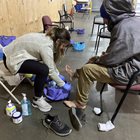When doctoral candidate Kari Jo West (COB ’24) started her journey at KCU to become a psychologist, she never envisioned she would end up behind bars. That changed the day she began her role as a psychology intern at the Bureau of Prisons.
West remembers when she first walked through the gates of the prison and the sound of clanging bars closing behind her. “There are multiple gates that you have to keep going through,” she said. “They scan all of your stuff and then scan you. You can’t wear certain things; can’t bring certain things with you. You are literally in prison.”
The Past
West traces her passion for psychology all the way back to high school. “I was in advanced placement psychology, and I had no idea what it even meant. My teacher was talking about schizophrenia, and I just found it fascinating!” she remarked. Over the years, West spent time reading and studying schizophrenia and carried her interests into her undergraduate degree, where her general thesis was focused on psychosis and psychotic disorders.
“Coming to KCU, I was dead set on going inpatient hospital, working with people with schizophrenia. I have a double major in biology and psychology and minor in chemistry, so I’m really fascinated by the mind and whole-body connections,” she added.
However, the COVID-19 pandemic brought about programmatic changes that exposed West to other opportunities, such as the opportunity to work with clients with borderline personality disorder.
“I think most people run away from these clients,” West shared. “They can be quite difficult to work with, but for some reason I loved it!” West knew she had found her calling, and that completely changed her career trajectory. Looking down the new path ahead of her, she asked herself, “What are personality disorders, and where can I find them the most?”
The Present
Going into her internship at the Bureau of Prisons, West expected there to be training, but she didn’t know that as a psychology intern she would be trained to serve as a correctional worker. “We are considered correctional workers first and psychology interns second,” said West. While her preference is not have to use her new skills in shakedowns and pat-downs, she is grateful to have that training and the ability to jump in and be of assistance should the need arise.
West takes great pride in her role at the prison. “It’s important to be empathic to the person and not what got them there. My job is to do good and treat patients. It’s about how we can get you to work effectively and safely while you are here,” she explained.
Amy Sickel, PsyD, director of clinical training, Health Service Psychology at KCU, was not surprised when West started talking to her about her options for internships inside the Bureau of Prisons. “Kari Jo’s greatest strengths are her patience and the fact that she gets things done. It’s not about her; it is about how she serves others,” said Sickel.
While KCU did not teach West about prison culture specifically, she credits KCU with preparing her for such a specialized internship. “KCU prepared me to be able to approach such a niche setting in a semi-confident, competent way – I would not have been prepared to do that if I had not gone to KCU.”
West finds herself reflecting on the teachings of Amy Shoffner, PsyD, adjunct assistant professor and clinical supervisor at KCU, and is grateful for her expertise and mentorship. “Dr. Shoffner taught me great boundaries in my first year and really established early on that you need to take care of yourself.” West takes the stance that she can do the best she can while at work and hopefully leave an impact, but taking it home does not help her and ultimately does not help the people she works with. “To help them, I have to have some space,” she expressed. “And that doesn’t come easy for me. That was something that was drilled into me by Dr. Shoffner, and it’s very important.”
The Future
According to West, the reality of prison is nicer and kinder than what is portrayed on television. “It’s important to know that we are not the judge and jury. We are not judging these people. We are not the people who are sentencing them; others have already done that. What we are there for is to make sure that their time there is spent as healthily as possible and that they can serve their time, get out and hopefully our impact on them is lasting enough that we don’t see them again. That’s the ultimate goal – that we don’t ever see them again because they are living healthy lives in their communities,” she said.
“Being able to relate and being able to do psychology with the inmates and help them. Having them seem receptive to it – that’s what is meaningful to me,” added West. “And being able to do that is a skill; and I think that if people have that skill, this setting is very important for people to get into.”
There is a tremendous need for doctors and psychologists in the Bureau of Prisons, and West is excited about helping fulfill that need while also shining a light on the incredible work that is done by individuals in this unique setting.
Kari Jo West never envisioned herself behind bars, but it turns out she might be exactly where she is meant to be.


_20230503141952_0.jpg?w=140&h=140)

(0) Comments